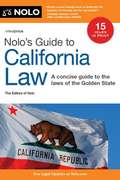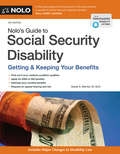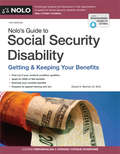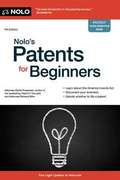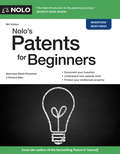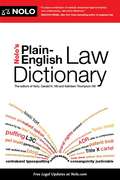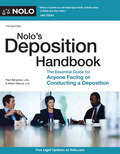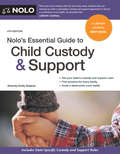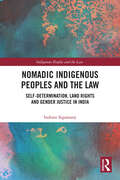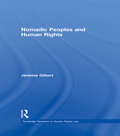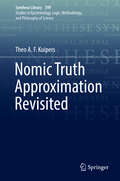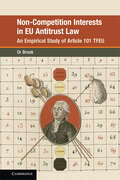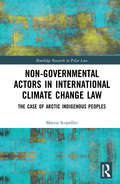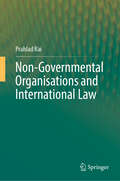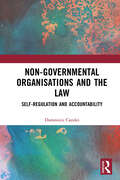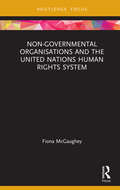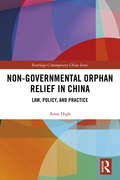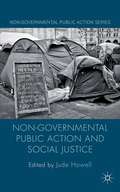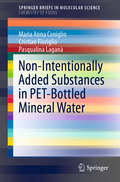- Table View
- List View
Nolo's Guide to California Law
by Editors Of NoloCalifornia law in broken down in plain-English. This handy little legal reference is an essential resource for every California home and business. Nolo's Guide to California Law provides you with quick, clear answers to the everyday questions you have about: child support custody consumer rights employee rights divorce bankruptcy adoption jury duty real estate debt and credit workplace rights workers' comp wills landlords and tenants serious illness and much more This is the only plain-English guide to the laws that affect Californians every day -- and now it is completely updated, covering domestic partnerships, employment protections, consumer privacy and more! Check out Nolo's list of California products. Not a California resident? Check out Nolo's Encyclopedia of Everyday Law.
Nolo's Guide to California Law (9th edition)
by Lisa Guerin Patricia GimaNolo's Guide to California Law explains the laws that affect you every day. Inside, you'll find hundreds of topics organized into easy-to-find categories. Just look up a legal issue--you'll find a clear explanation of what you need to know. Get the scoop on: courts and lawsuits, families and children, employee rights, government benefits, inheritance and wills, small business, traffic and vehicles, debts and credit, serious illness, landlords and tenants, small businesses, and more. The revised 9th edition is completely updated, and now covers domestic partnerships, employment protections, consumer privacy--and more!
Nolo's Guide to Social Security Disability: Getting & Keeping Your Benefits
by David A. Morton IIINolo's Guide to Social Security Disability covers the criteria for getting disability benefits for back problems, heart and cardiovascular disease, diabetes, cancer, autoimmune diseases, mental issues like depression and anxiety, and 200 more medical conditions. Learn how to match the medical details of your disability to Social Security regulations to make sure you have the right evidence to qualify for the benefits you're due when you apply. This guide is written by a former Chief Medical Consultant for the Social Security Administration whose expert deciphering of the medical portions of SSA regulations will help you understand how you can get benefits. If you've been denied benefits already, this book will tell you how to find out why and what steps to take to prove that you should get benefits on appeal. This edition is completely updated with the latest rules and information plus updated figures for 2018 and many updated medical listings.
Nolo's Guide to Social Security Disability: Getting & Keeping Your Benefits
by David A. Morton IIIQualify for Social Security disability benefits, quickly and easily Nolo's Guide to Social Security Disability covers the criteria for getting disability benefits for back problems, heart and cardiovascular disease, diabetes, cancer, autoimmune diseases, mental issues like depression and anxiety, and 200 other medical conditions. Learn how to match the medical details of your disability to Social Security regulations to make sure you have the right evidence to qualify for the benefits you're due when you apply. This guide is written by a former Chief Medical Consultant for the Social Security Administration whose expert deciphering of the medical portions of SSA regulations will help you understand how you can get benefits. If you’ve been denied benefits already, this book will tell you how to find out why and what steps to take to prove that you should get benefits on appeal. This edition is completely updated with the latest rules and information plus updated figures for 2020 and many updated medical listings.
Nolo's Patents for Beginners
by Richard Stim David PressmanA brilliantly clear and up-to-date patent guide Patent law is changing, and this bestselling primer on patent law has up-to-date information on the America Invents Act, the most important change to American patent law in two centuries. Packed with detailed information, Nolo's Patents for Beginners explains how to: document your invention acquire patent rights "read" a patent application understand how and why to make a patent search determine patent ownership find patent information understand international patent law decide whether to file a provisional patent Nolo's Patents for Beginners provides plain-English explanations of patent law, patent and invention resources and a glossary of patent terms. The 8th edition is completely updated to cover all changes in patent law and regulations, including the latest on filing for provisional patent status.
Nolo's Patents for Beginners
by David Pressman AttorneyPatents are explained in this clear guide to every step of the patenting process. Do you have a great idea for a product? Do you toil away in an office, garage or basement lab day by day in the hopes of bringing a new widget to life? What will you do when it's alive and kicking? Here's the primer every first-time inventor needs. Packed with detailed information and concise explanations, Nolo's Patents for Beginners defines what a patent is and what it can do for you. Step by step, it explains how to: - use basic patent principles - document an invention - conduct a patent search - acquire patent rights - "read" an application - determine patent ownership - analyze disputes - find patent information - interpret international patent law Nolo's Patents for Beginners provides sample forms and letters, resources and a glossary of terms. This edition is completely revised to cover all changes in patent case law and updated regulations for inventors applying for a patent.
Nolo's Patents for Beginners (5th edition)
by Richard Stim David PressmanWhat are patents? Why do you need one? How do you get it? This book provides a clear explanation of the entire process.
Nolo's Patents for Beginners: Quick & Legal
by Richard Stim David PressmanA brilliantly clear and up-to-date patent guide Patent law is changing, and this bestselling primer on patent law has up-to-date information on the America Invents Act, the most important change to American patent law in two centuries. Packed with detailed information, Nolo's Patents for Beginners explains how to: document your invention acquire patent rights "read" a patent application understand how and why to make a patent search determine patent ownership find patent information understand international patent law, and decide whether to file a provisional patent. Nolo's Patents for Beginners provides plain-English explanations of patent law, patent and invention resources and a glossary of patent terms. This edition is completely updated to cover all changes in patent law with the latest implications of recent federal patent law reform.
Nolo's Plain-English Law Dictionary
by Gerald Hill AttorneyLearn the language of the law, without the legalese! Open the average law dictionary and chances are you'll feel more confused than before you read a word. Nolo's Plain-English Law Dictionary is different. From "abrogate" to "zero tape", we've cut down on the Latin and defined common (and some not-so-common) terms you can really use to understand and access the law. Set aside those dusty, outdated law dictionaries! Written for the 21st century, this essential reference contains complete definitions of the legal terms you need today. If you're a law student, paralegal, accountant, small business owner or librarian -- anyone whose work or life touches the law -- this fully up-to-date A to Z guide puts access to the law into your hands. Nolo's Plain-English Law Dictionary contains 3,800 plain-English legal definitions, including many newly coined terms you'll find online and off, such as "typosquatting" and "patent troll". Of course, if you need definitions for legal standards -- even when they're in Latin -- you'll find those here too. Plus, find a copy of the Constitution of the United States of America for your reference in the pages following the complete list of definitions.
Nolo's Quick LLC: All You Need to Know About Limited Liability Companies (Quick & Legal)
by Anthony MancusoLimit your liability, simplify taxes with an LLC. If you run your own business as a sole proprietorship or partnership, you’ve probably heard of the advantages of limited liability companies—especially the way an LLC can protect personal assets from business debts. But LLCs aren’t the best structure for every business.
Nolo's Simple Will Book (7th edition)
by Denis CliffordMaking a will is a significant matter, worth serious thought. Happily, however, writing your will does not have to be difficult, and most people don't need a lawyer to do it. Nolo has been helping people make their own legally valid wills for more than 25 years, and Nolo's Simple Will Book, remains one of our most popular estate planning books--for good reason. It has clear, easy-to-understand instructions, and it explains when you might need a lawyer's help. The wills in this book are legal in every state except Louisiana (which has its own set of estate planning laws that differs from all other states'). These wills are fine for most folks with a modest to moderate amount of property and typical assets. If you have a more complicated situation, or a large estate--say, more than $2 million--you will probably want some additional help from a lawyer or tax expert.
Nolo’s Deposition Handbook: The Essential Guide For Anyone Facing Or Conducting A Deposition
by Paul Bergman Albert J. MooreGetting deposed? Conducting a deposition? Here's the book you need to take the mystery out of the deposition process and answer questions with confidence. You'll even learn the three "golden rules" for answering questions and the trick questions lawyers often use to influence testimony. <P><P>A perfect book for law students, lawyers, legal assistants, witnesses, expert witnesses, and anyone who wants to represent themselves in court, Nolo's Deposition Handbook provides all the information you need to sail through the deposition process with confidence. This edition contains updated statutes, cases, and rules -- plus, new material on "electronic discovery" which applies to information stored in computers, including records and emails.
Nolo’s Essential Guide to Child Custody and Support
by Emily DoskowWhen you’re getting divorced, you can make a tough time easier for your children (and yourself) if you and the other parent can create your own custody plan and agree on child support. If you can’t work out custody and support, you’ll have to head to court and ask a judge to step in Either way, Nolo’s Essential Guide to Child Custody & Support can help. You’ll learn: how negotiation and mediation can keep costs down, ease the transition for kids, and improve future dealings with your ex where to find your state’s child support guidelines how judges make custody decisions how to enforce and change custody and support orders how court trials work what military families need to know when you need a lawyer and how to work with one You’ll also find specifics about each state’s laws, including what factors courts consider when they rule on custody arrangements, what happens when one parent wants to move away with the children, and how you can change custody or support orders.
Nomadic Indigenous Peoples and the Law: Self-Determination, Land Rights and Gender Justice in India (Indigenous Peoples and the Law)
by Indrani SigamanyThis book investigates the unique challenges faced by nomadic Indigenous peoples in claiming self-determination and rights to their ancestral lands.Nomadic or mobile Indigenous peoples have been largely ignored in the wider context of Indigenous land rights, but such groups are often even more marginalised than other Indigenous peoples. Focusing on the Indian Forest Rights Act, this book explores how access to justice remains uneven and elusive for mobile Indigenous communities who have been dispossessed of their lands. Exposing the lack of recognition of usufruct rights and of customary land laws, which have caused a more acute displacement from ancestral lands for mobile Indigenous peoples, the book reveals how their nomadic livelihoods have excluded them from government policies and laws. The book further examines the gendered and intersectional aspects of this exclusion. In conclusion, the book maintains that legislation such as the progressive Forest Rights Act is necessary, but not enough, to protect the rights of mobile Indigenous peoples. In such cases, the book argues, legislation has to be supported by nuanced governance, which is sensitive to the particular challenges presented by Indigenous peoples who are further marginalised through nomadic lifestyles.This book will be of interest to scholars and researchers working in the areas of Indigenous studies, socio-legal studies, human and minority rights, and gender and international development.
Nomadic Peoples and Human Rights (Routledge Research in Human Rights Law)
by Jérémie GilbertAlthough nomadic peoples are scattered worldwide and have highly heterogeneous lifestyles, they face similar threats to their mobile livelihood and survival. Commonly, nomadic peoples are facing pressure from the predominant sedentary world over mobility, land rights, water resources, access to natural resources, and migration routes. Adding to these traditional problems, rapid growth in the extractive industry and the need for the exploitation of the natural resources are putting new strains on nomadic lifestyles. <P><P> This book provides an innovative rights-based approach to the issue of nomadism looking at issues including discrimination, persecution, freedom of movement, land rights, cultural and political rights, and effective management of natural resources. Jeremie Gilbert analyses the extent to which human rights law is able to provide protection for nomadic peoples to perpetuate their own way of life and culture. The book questions whether the current human rights regime is able to protect nomadic peoples, and highlights the lacuna that currently exists in international human rights law in relation to nomadic peoples. It goes on to propose avenues for the development of specific rights for nomadic peoples, offering a new reading on freedom of movement, land rights and development in the context of nomadism.
Nomic Truth Approximation Revisited (Synthese Library #399)
by Theo A. KuipersThis monograph presents new ideas in nomic truth approximation. It features original and revised papers from a (formal) philosopher of science who has studied the concept for more than 35 years.Over the course of time, the author's initial ideas evolved. He discovered a way to generalize his first theory of nomic truth approximation, viz. by dropping an unnecessarily strong assumption. In particular, he first believed to have to assume that theories were maximally specific in the sense that they did not only exclude certain conceptual possibilities, but also that all non-excluded possibilities were in fact claimed to be nomically possible.Now, he argues that the exclusion claim alone, or for that matter the inclusion claim alone, is sufficient to motivate the formal definition of being closer to the nomic truth. The papers collected here detail this generalized view of nomic truthlikeness or verisimilitude.Besides this, the book presents, in adapted form, the relation with several other topics, such as, domain revision, aesthetic progress, abduction, inference to the best explanation, pragmatic aspects, probabilistic methods, belief revision and epistemological positions, notably constructive realism.Overall, the volume presents profound insight into nomic truth approximation. This idea seeks to determine how one theory can be closer to, or more similar to, the truth about what is nomically, e.g. physically, chemically, biologically, possible than another theory. As a result, it represents the ultimate goal of theory oriented empirical science.Theo Kuipers is the author of Studies in Inductive Probability and Rational Expectation (1978), From Instrumentalism to Constructive Realism (2000) and Structures in Science (2001). He is the volume-editor of the Handbook on General Philosophy of Science (2007).In 2005 there appeared two volumes of Essays in Debate with Theo Kuipers, entitled Confirmation, Empirical Progress, and Truth Approximation and Cognitive Structures in Scientific Inquiry.
Non-Competition Interests in EU Antitrust Law: An Empirical Study of Article 101 TFEU (Global Competition Law and Economics Policy)
by Or BrookThis book is the first to empirically examine the role of non-competition interests (public policy) in the enforcement of the EU's prohibition on anti-competitive agreements. Based on an original quantitative and qualitative database of over 3,100 cases, this book records all of the public enforcement actions of Article 101 TFEU taken by the Commission, EU Courts, and the national competition authorities and courts of five representative Member States (France, Germany, Hungary, the Netherlands, and the UK). The book not only exposes explicit tools in which non-competition interests played a role, but also sheds light on the “dark matter” of balancing, namely, invisible forms of balancing triggered by the institutional and procedural setup of the competition enforcers. Moreover, it contributes to the empirical-legal study of various other aspects of EU competition law enforcement, such as its objectives, the more economic approach, decentralized enforcement, and the functioning and success of Regulation 1/2003.
Non-Discrimination in International Trade in Services
by Nicolas F. Diebold"The principle of non-discrimination is fundamental to the regulation of international trade in goods and services. In the context of trade in goods, the concept of 'like products' has become a key element of the legal analysis of whether a trade obstacle violates GATT non-discrimination obligations. The equivalent concept of 'like services and service suppliers' in GATS rules on non-discrimination has received little attention in WTO jurisprudence. In light of the remaining uncertainties, Nicolas Diebold analyses the legal problems of the GATS 'like services and services suppliers' concept using a contextual and comparative methodology. The 'likeness' element is not analysed in isolation, but in context with 'less favourable treatment' and regulatory purpose as additional elements of non-discrimination. The book also explores how far theories from non-discrimination rules in GATT, NAFTA, BITs and EC as well as market definition theories from competition law may be applied to 'likeness' in GATS"--
Non-Governmental Actors in International Climate Change Law: The Case of Arctic Indigenous Peoples (Routledge Research in Polar Law)
by Marzia ScopellitiFocusing on how to improve the participation of non-governmental actors in the making of international climate change laws, this book is a conversation on the relevance of a human rights-based approach to international climate change law-making. The book considers a possible reform of the United Nations Framework Convention on Climate Change institutional arrangement, inspired by the practice and model of participation of Arctic Indigenous Peoples in the Arctic Council. Different non-State entities play a fundamental role in the development and enforcement of the climate change regime by enhancing the knowledge base of decision-making, keeping States in line with their commitments, and engaging in private initiatives aimed at mitigating the impacts of global warming. Albeit non-governmental and subnational actors increasingly work alongside States in the making of a climate change regime, the category of observers through which they participate in intergovernmental negotiations only gives them limited rights and their participation in international norm-making has at times been impaired. The relevance of a human rights-based approach consists in recognising the status of individuals and groups as rights-holders under human rights law, a paradigm that was first established by Arctic Indigenous Peoples when claiming their participatory rights in the Arctic Council, the main forum of governance of the Arctic region. This book argues that, in the absence of a globally binding treaty regulating procedural rights in intergovernmental negotiations, the emerging relationship between human rights and climate change could serve as a legal basis for the enhancement of non-governmental actors’ procedural rights, establishing the right to participation as a right in itself and which can benefit the governance of climate change. Due to the relevance of the addressed subject, the book is destined to a broad readership and will be of use to academic researchers, law practitioners, policy-makers and non-governmental organisations’ representatives.
Non-Governmental Organisations and International Law
by Prahlad RaiThis book explores how non-governmental organizations (NGOs), with their sphere of influence within the State and beyond, enrich the international community by working on critical areas affecting people’s lives and expectations, to facilitate a more humanising international law. It provides ideas, highlights issues, and identifies actors, actions, and the scope of NGOs in international law. It charts possibilities and limitations of NGOs within the legal framework of a State and its evolution over the years. The book highlights how NGOs, having obtained 'consultative status' from the UN Economic and Social Council, have now extended their access and area of influence to international actors like inter-governmental organisations, international courts and tribunals. It provides an overview of NGO's performance and the important role they play in the making of human rights, protection of environment and business ethics. The book is primarily doctrinal containing case studies of important NGOs. The purview is an inquiry, analysis and overview of literature of NGOs in international law from a wide range of sources. The book will help shape the debate over power and functions of NGOs in the background of new loci of NGOs’ work. It is useful for students, research scholars, the NGO community, corporations' CSR departments, and concerned governmental agencies. Additionally, being interdisciplinary in nature, it caters to the demands of politics, sociology, management, public policy and social work apart from law.
Non-Governmental Organisations and the Law: Self-Regulation and Accountability
by Domenico CaroleiThis book examines accountability issues and the problems of regulating non-governmental organisations (NGOs) through self-regulation. It focuses on methods of self-regulation for NGOs in response to prominent scandals that revealed problems with their accountability, notably the ‘Mafia Capitale’ scandal in Italy and the Oxfam GB scandal in Haiti. It also touches upon other accountability failures, including the allegations against the WWF of facilitating human rights abuses of indigenous groups in Cameroon. The work brings a legal approach to the topic of NGO self-regulation and accountability, contributing to the academic and policy debate in several ways. It advances a brand-new theoretical model to explain the reasons behind NGOs non-compliance with self-regulation, examines the reasons for self-regulation failures, identifies new accountability routes, and recommends proposals for sectoral reform. The book will be of great interest to scholars, researchers and PhD students who work in the area of NGO regulation and accountability from a legal perspective as well as to accountability and NGO scholars working in other disciplines. It will also appeal to practitioners and policymakers who work on the development of NGO policies.
Non-Governmental Organisations and the United Nations Human Rights System (Routledge Research in Human Rights Law)
by Fiona McGaugheyNon-governmental Organisations (NGOs) have become important, although sometimes overlooked, actors in international human rights law. Although NGOs are not generally provided for in the hard law of treaties, they use the UN human rights system to hold Governments to account. A key way in which they do so is using State reporting mechanisms, initially the UN treaty bodies, but more recently supplemented by the Human Rights Council’s Universal Periodic Review. In doing so, NGOs provide information and contribute to developing recommendations. NGOs also lobby for new treaties, contribute to the drafting of these treaties, and bring individual’s complaints to the UN human rights bodies. This book charts the historical development of the NGO role in the UN. It examines the UN regulation of NGOs but the largely informal nature of the role, and an exploration of the various types of NGOs, including some less benign actors such as GONGOs (Governmental NGOs). It also draws on empirical data to illustrate NGO influence on UN human rights bodies and gives voice to stakeholders both inside and outside the UN. The book concludes that the current UN human rights system is heavily reliant on NGOs and that they play an essential fact-finding role and contribute to global democratisation and governance.
Non-Governmental Orphan Relief in China: Law, Policy, and Practice (Routledge Contemporary China Series)
by Anna HighBased on field studies and in-depth interviews across rural and urban China, this book presents a socio-legal analysis of non-state organised care for some of China's most vulnerable children. The first full-length book to examine non-state organised care of modern China's ‘lonely children’ (gu'er), this book describes the context in which abandonment occurs and the care provided to children unlikely to be adopted because of their disability. It also explores the various faith groups and humanitarian workers providing this care in private orphanages and foster homes in response to perceived deficiencies in the state orphanage system, in the context of a broader societal shift from ‘welfare statism’ to ‘welfare pluralism’. Formal law and policy has not always kept pace with this shift. This study demonstrates that, in practice, state regulation of these unauthorised care providers has mostly centred on local-level negotiations, hidden rules, and discretion, with mixed outcomes for children. However there has also been a recent shift towards tighter state control and clearer laws, policies, and standards. This timely research sheds light on the life paths and stories of today's ‘lonely children’ and the changing terrain of civil society, humanitarianism, policy-making, and state power in modern China. As such, this book will appeal to students and scholars of Asian and Chinese studies, law and society, NGOs, and comparative social and child welfare.
Non-Governmental Public Action and Social Justice
by Jude HowellThis unique collection explores the different organizational forms, strategies and tactics that activists adopt. The authors examine how established trades unions struggle to reform, how non-governmental public actors negotiate various dilemmas, and the efforts of non-governmental public actors to secure justice.
Non-Intentionally Added Substances in PET-Bottled Mineral Water (SpringerBriefs in Molecular Science)
by Pasqualina Laganà Maria Anna Coniglio Cristian FioriglioThis book discusses a major issue in the food contact materials industry: non-intentionally added substances (NIAS), and their impact on PET-bottled water. NIAS are chemical compounds that are present in food contact materials but have not been added for technical reasons during the production process, and consumers are usually unaware of their presence. NIAS can include decomposition or degradation products, impurities in the raw materials, unwanted by-products or contaminants from recycling processes, and they pose a challenge for packaging manufacturers.In Europe, the EU Regulations No. 1935/2004 and 10/2011 set out, respectively, the general principles of safety and inertness for all packaging materials, and rules on the composition of plastic food-contact materials. Among the plastics commonly used for bottled water and other non-alcoholic refreshment beverages, polyethylene terephthalate (PET) is the most favoured thanks to its chemical and physical stability, its transparency, low weight and good recyclability. Further, very few additives are used for its manufacture. Nonetheless, due to the complex formulations of polymers, processes and storage, NIAS can also be found in PET-bottled water, with potential cancerogenic or toxic effects.This book provides an overview of the European regulation of NIAS in plastic packaging materials, offering insights into their chemical composition in PET-bottled water. Lastly, it provides a useful discussion on NIAS and their toxicity.
